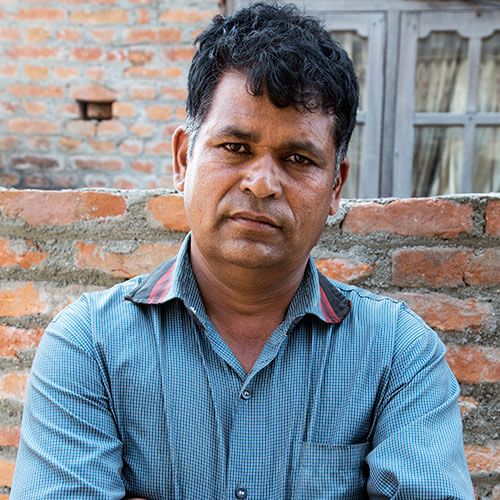A former police employee arbitrarily detained and tortured in 2002, 2003 and 2006.
FACTS

Mr. Hom Bahadur Bagale served in the Nepalese police from 13 February 1984. On 28 November 2002, he was unduly arrested and subjected to torture to confess his involvement in the alleged theft of gold from his superior. He was handcuffed, forced to wear a hood and placed in solitary confinement with inhumane detention conditions, and subjected to torture and severe ill-treatment.
Mr. Bagale managed to escape and file complaints at the Police Headquarters against his sufferings. The superiors pressured him to withdraw his complaint, but he refused. On 5 February 2003, he was again taken to the Armed Police Battalion, Kathmandu, where he was arbitrarily held until 21 February 2003. He somehow managed to escape and go home. On 25 February 2003, he was brought back to the Battalion and detained until 3 April 2003.
On 20 March 2006, he was arbitrarily deprived of his liberty, beaten, and taken to the Quarter Guard of the Armed Police Battalion No. 1. where he was held until 22 March 2006. On 22 March 2006, he was again detained without an arrest warrant and brought to Hanumandhoka, where he was arbitrarily kept until 28 March 2006 and subjected to further torture and ill-treatment.
Read more: here
PROCEDURE
On 24 December 2002, Mr. Bagale applied to the Police Headquarters, Kathmandu complaining about the ill-treatment, beatings, and torture that was not formally registered. On 10 January 2003, he filed a complaint before the Kathmandu District Court (KDC) to get compensated for the harm suffered. He was repeatedly threatened by various policemen for this legal step and pressured to withdraw the complaint.
On 4 April 2003 Mr. Bagale filed a complaint before the National Human Rights Commission (NHRC), requesting to protect his life. The NHRC did not take any action upon Mr. Bagale’s complaint because his case was already sub judice in court. On the same day, he also filed a petition before the Chief District Officer of the District Administration Office in Kathmandu requesting the adoption of measures to protect his life vis-à-vis threats and harassment suffered from other police officers. On 13 July 2004, the KDC rejected Mr. Bagale’s complaint. He appealed against this decision, but on 3 April 2007, the Appellate Court upheld the KDC’s ruling. On 1September 2014, the Supreme Court of Nepal too upheld the rulings of the lower courts.
On 22 March 2006, he was again detained without an arrest warrant and brought to Hanumandhoka. On 24 March 2006, a habeas corpus writ was submitted to the Supreme Court of Nepal on Mr. Bagale’s behalf. The Supreme Court considered Mr. Bagale’s arrest and detention arbitrary. Nevertheless, the Supreme Court of Nepal did not pronounce itself on the alleged torture and ill-treatment suffered by Mr. Bagale.
On 26 April 2006, Mr. Bagale filed a petition before the KDC against 12 policemen. He requested Nepalese Rupees 100,000 (approximately 1000 USD) as compensation for the harm suffered and departmental action against the policemen concerned. On 18 September 2008, the KDC ruled that Mr. Bagale was tortured and ordered the Nepalese government to pay Nepalese Rupees 21,000 (approximately 210 USD) to the victim. However, the KDC denied taking departmental action against the perpetrators. On 12 June 2012, the decision was upheld by the Appellate Court of Patan. On 1 September 2014, the Supreme Court of Nepal denied the revision of the previous decisions taken by the lower courts. Mr. Bagale did not even receive the amount of money determined by the KDC to grant him compensation for the harm suffered.
In December 2015, Mr. Bagale filed the case with the Human Rights Committee (HRC), represented by non-governmental organisation TRIAL International. The HRC decided the case in November 2020.
It found that Mr Bagale was the victim of the violation of the right against liberty, security, privacy, arbitrary interference with family and torture and indicated various measures of reparation.
Read the decision: English
RECOMMENDATIONS
The Committee recommended that Nepal conduct a prompt, effective and thorough, impartial and independent investigation that is transparent into the facts surrounding the arrest, detention and torture and to provide the author with detailed information about the results of the investigation. It also recommended Nepal to prosecute and punish those found responsible for the violations committed, ensure that necessary and adequate psychological rehabilitation and medical treatment, adequate compensation, including appropriate measures of satisfaction, ensure that its legislation effectively criminalizes torture and provides for appropriate sanctions and remedies commensurate with the gravity of the crimes. In addition it is required to translate the decision is translated into Nepali and distributed widely.
| Conduct a prompt investigation that is effective and thorough, impartial and independent, and transparent into the facts surrounding the arrest, detention and torture of Mr. Hom Bahadur Bagale and the treatment he suffered during detention, both in 2002 and in 2006, as well as the interference with his private life, home and family life | |
| Nepal has failed to adopt any measures with regard to the investigation of the crimes at stake. | |
| Investigation into the facts of the case, prosecution and sanctions of the perpetrators. | |
| No information on the investigation of the case has been provided to Mr. Bagale and no one has been prosecuted and sanctioned for the crimes concerned. | |
| Adequate psychological rehabilitation and medical treatment. | |
| No measures have been adopted to implement the Committee’s recommendation regarding the provision of adequate psychological rehabilitation and medical treatment. | |
| Adequate compensation | |
| Mr. Bagale has not received any form of compensation for the harm suffered. | |
| Appropriate measures of satisfaction | |
| The author has not received any measure of satisfaction. | |
| Translation and Dissemination of the Views | |
| The Views of the Human Rights Committee on this communication have neither been translated into Nepali nor disseminated widely. |
Note these are unofficial gradings as the Human Rights Committee has not yet commented on implementation.
Efforts for Implementation
- On 20 July 2021, a follow up report was submitted to the Human Rights Committee.
